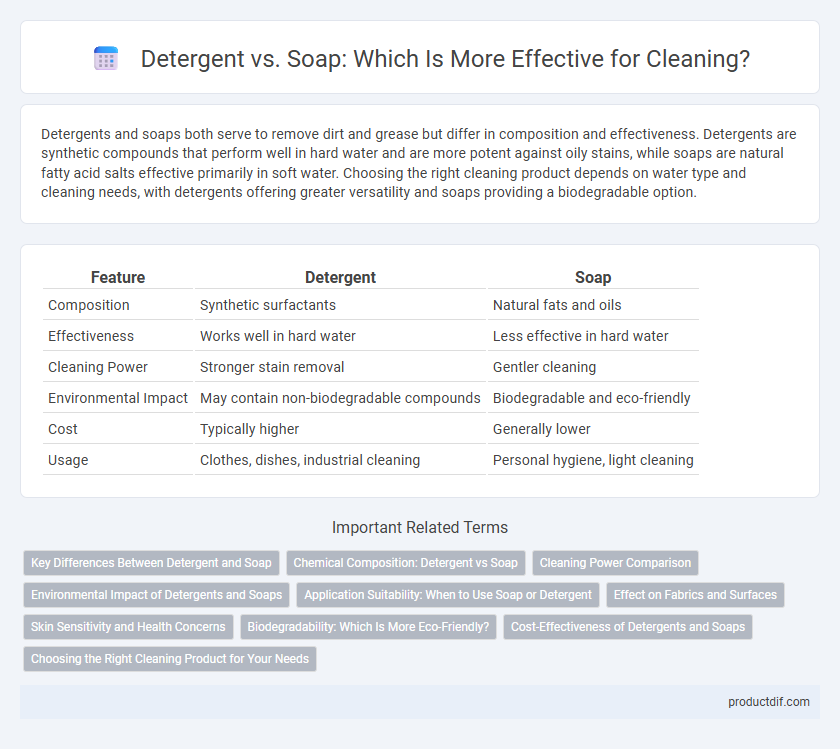Detergents and soaps both serve to remove dirt and grease but differ in composition and effectiveness. Detergents are synthetic compounds that perform well in hard water and are more potent against oily stains, while soaps are natural fatty acid salts effective primarily in soft water. Choosing the right cleaning product depends on water type and cleaning needs, with detergents offering greater versatility and soaps providing a biodegradable option.
Table of Comparison
| Feature | Detergent | Soap |
|---|---|---|
| Composition | Synthetic surfactants | Natural fats and oils |
| Effectiveness | Works well in hard water | Less effective in hard water |
| Cleaning Power | Stronger stain removal | Gentler cleaning |
| Environmental Impact | May contain non-biodegradable compounds | Biodegradable and eco-friendly |
| Cost | Typically higher | Generally lower |
| Usage | Clothes, dishes, industrial cleaning | Personal hygiene, light cleaning |
Key Differences Between Detergent and Soap
Detergents are synthetic cleaning agents made from petrochemicals, whereas soaps are natural products derived from animal fats or vegetable oils combined with alkalis. Detergents perform well in hard water thanks to their chemical structure, preventing residue buildup, while soaps tend to form scum in hard water environments. Soaps are biodegradable and environmentally friendly, but detergents offer better cleaning efficiency on oily and greasy stains due to their surfactant composition.
Chemical Composition: Detergent vs Soap
Detergents are synthetic surfactants derived from petrochemicals or oleochemicals, featuring sulfonate or sulfate groups that enhance solubility in hard water. Soaps are natural salts of fatty acids formed by the saponification of vegetable oils or animal fats with alkali, such as sodium hydroxide. The chemical composition difference influences their cleaning efficiency, foaming properties, and environmental impact.
Cleaning Power Comparison
Detergents outperform soaps in cleaning power due to their synthetic surfactants that effectively break down grease and oils even in hard water conditions, unlike soaps which can form scum. Detergents maintain their efficiency regardless of water hardness because they do not react with minerals like calcium and magnesium. The superior grease-cutting ability and versatility of detergents make them more effective for a wide range of cleaning tasks compared to traditional soaps.
Environmental Impact of Detergents and Soaps
Detergents often contain synthetic surfactants that can persist in water systems, leading to potential harm to aquatic life and disrupting ecosystems. In contrast, soaps are typically biodegradable and derived from natural fats and oils, resulting in a lower environmental footprint. However, some soaps contain additives that may affect water quality, so choosing phosphate-free and eco-friendly options further reduces environmental impact.
Application Suitability: When to Use Soap or Detergent
Soap is ideal for cleaning natural fibers like cotton and wool, as it is biodegradable and gentle on the skin, making it suitable for personal hygiene and delicate fabrics. Detergents excel in removing grease and oil from synthetic fabrics, hard surfaces, and heavily soiled laundry, functioning effectively in both hard and soft water conditions. For household cleaning, soap is preferred for light cleaning tasks, while detergents are favored for tough stains and industrial applications.
Effect on Fabrics and Surfaces
Detergents contain synthetic surfactants that effectively remove dirt and stains while being gentle on various fabrics and surfaces, preventing damage and color fading. Soaps, made from natural fats and alkali, can leave residue that may cause fabric stiffness and surface buildup, reducing material lifespan. Choosing detergents over soaps ensures better fabric care, maintaining softness and color vibrancy in clothing and household textiles.
Skin Sensitivity and Health Concerns
Detergents often contain synthetic chemicals and surfactants that can irritate sensitive skin and cause allergic reactions, while soaps, made from natural fats and oils, tend to be gentler and better tolerated by individuals with skin sensitivities. Prolonged use of detergents may disrupt the skin's natural barrier, leading to dryness and increased susceptibility to eczema. Choosing soap with moisturizing ingredients like glycerin or aloe vera can help maintain skin health and reduce the risk of irritation.
Biodegradability: Which Is More Eco-Friendly?
Detergents and soaps differ significantly in biodegradability, with soaps generally breaking down more easily in the environment due to their natural fatty acid base. Many modern detergents contain synthetic compounds that can persist longer in waterways, potentially harming aquatic life. Choosing biodegradable soap formulated with plant-based ingredients promotes eco-friendly cleaning and reduces environmental impact.
Cost-Effectiveness of Detergents and Soaps
Detergents often provide better cost-effectiveness than soaps due to their higher cleaning efficiency at lower quantities, reducing overall usage and expense. Soaps, while generally cheaper per unit, tend to require more product to achieve comparable cleaning results, increasing long-term costs. Furthermore, detergents are less affected by hard water, minimizing product wastage and enhancing cost savings.
Choosing the Right Cleaning Product for Your Needs
Detergents contain synthetic surfactants that perform well in hard water and are effective on greasy stains, making them ideal for laundry and dishwashing tasks. Soaps, made from natural fats and oils, are biodegradable and gentler on the skin, suited for personal care and light cleaning. Selecting the right product depends on cleaning requirements, water hardness, and environmental considerations to ensure optimal performance and sustainability.
Detergent vs Soap Infographic

 productdif.com
productdif.com